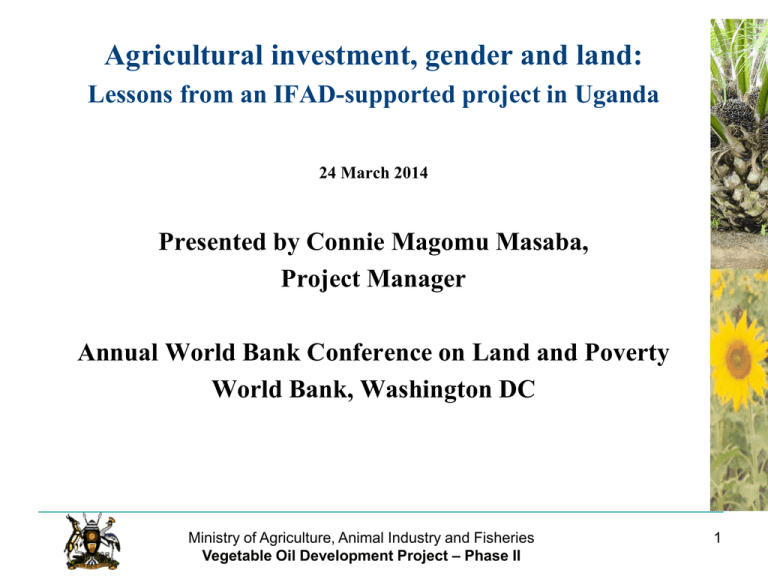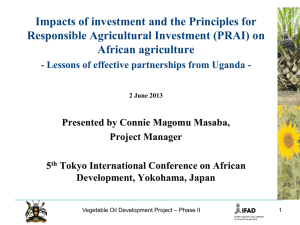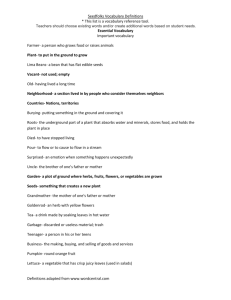Jonckheere-473_ppt
advertisement

Agricultural investment, gender and land: Lessons from an IFAD-supported project in Uganda 24 March 2014 Presented by Connie Magomu Masaba, Project Manager Annual World Bank Conference on Land and Poverty World Bank, Washington DC Ministry of Agriculture, Animal Industry and Fisheries Vegetable Oil Development Project – Phase II 1 Vegetable Oil Development Project Main partners: smallholder farmers, Government of Uganda and private sector (Bidco) Support production and processing of oil palm to reduce reliance on imported vegetable oils and address low per capita vegetable oil consumption Combining small-scale production with largescale processing and integrating small-scale producers into the wider economy Ministry of Agriculture, Animal Industry and Fisheries Vegetable Oil Development Project 2 Business model - Overview Nucleus estate and contract farming Smallholders: 1,600 farmers (600 women) harvest ffb & sell to OPUL; cultivate 3500ha KOPGT: Intermediary between OPUL and farmers; provides services to farmers (extension, loans, transport,…) OPUL: Buys ffbs; manages nucleus estate of 6500ha and oil palm mill GoU: Purchased and leases land for nucleus estate; support smallholder involvement (including KOPGT); transportation infrastructure Ministry of Agriculture, Animal Industry and Fisheries Vegetable Oil Development Project 3 Business model - Overview Gender analysis and needs assessment at onset Women are engaged in the project in their own right as landowners or tenants, as wives of landowners or tenants, or as plantation workers Increasing impact on gender equality and strengthen women’s empowerment by: promoting economic empowerment enabling women and men to have equal voice and influence in relevant institutions and organisations Fostering a more equitable balance in workloads and in the sharing of economic and social benefits Ministry of Agriculture, Animal Industry and Fisheries Vegetable Oil Development Project 4 Business model - Ownership Farmers have a 10% minority share in OPUL and BUL owns the remaining 90% Land rights remain vested in smallholders, while BUL leases nucleus estate Nucleus estate: unencumbered public land and purchase of private land on a willing seller-willing buyer basis Increase women’s access to land (encumbered public land, purchased private land, sharecropping arrangements, land fund, legal support, sensitization of men) Ministry of Agriculture, Animal Industry and Fisheries Vegetable Oil Development Project 5 Business model - Voice Wide consultations with farmers and communities before implementation Farmers can influence decision making of company 10% share in OPUL Representation on OPUL board Representation on Oil Palm pricing committee Representation on the services cost panel Farmers’ interests represented by KOPGT and KOPGA Democratic elections Representation at different levels (units, blocks, district) Annual general meeting Strengthen women’s membership & participation Access to land, max and no min acreage, 578 women Quota of 30%, acceptance of male community members KOPGT staff and management Ministry of Agriculture, Animal Industry and Fisheries Vegetable Oil Development Project 6 Business model - Risks Stakeholders bear different risks: Smallholders: Purchase price determined through fluctuating market prices Production risks linked to weather, pest and other factors affecting harvest (mitigation: loans and “in kind” repayment system) Production risks linked to land tenure situation (mitigation: demonstration of legitimate access to land) Risk associated with loans (mitigation: co-guaranteeing approach) Risk of having ffb unduly rejected (mitigation: inspection officer) OPUL: Market risk as it has committed to purchase produce at guaranteed prices (demand is still very high) Ministry of Agriculture, Animal Industry and Fisheries Vegetable Oil Development Project 7 Business model Reward Farmers (of which 36% women) Improved and steady incomes ($390/month); fair price Say in decision-making of company Access to support package Extension (appropriate venue, timing & material; female officers; attention to basic business and marketing skills) Inputs credit (entry requirements do not exclude women) Assured market for produce Private sector Increased production (commercial benefits from investing in women) Increased sales Co-investment by farmers and government Government Increased tax incomes Increased investment in agriculture-FDI and New industry in place Employment creation Ministry of Agriculture, Animal Industry and Fisheries Vegetable Oil Development Project 8 Farmers Early results 578 women engaged in the project in their own right Investment in housing, schooling, farm and off-farm busninesses Improved land rights (landless and women, purchase of land, demonstration of legitimate access to land, legal support) Empowerment Community Creation of employment (2,000 employed on nucleus estate, 500 in farmer gardens and 1,600 directly as farmers) Address gender disparity (household mentoring) Improved infrastructure (e.g. 750 km of road network and ferry service) and services (e.g. financial and public) Production in other crops, livestock and complementary agricultural activities, tourism and other non-agricultural enterprises is expanding Illegal logging is down and less reliance on dwindling fish stocks Contribution of OPUL to the local government revenue of Kalangala District is being invested in improving facilities (schools, clinics, etc.) and infrastructure (roads and electricity) Increased economic activities (business and tourism) Poverty reduction Ministry of Agriculture, Animal Industry and Fisheries Vegetable Oil Development Project 9 Lessons Learned Effective partnership between rural smallholders and the private sector with positive development outcomes is possible Governments can play a positive role in agricultural investment projects (policy environment, mobilising smallholders, infrastructure and building trust) Choice of the business partners is very important willingness to work with smallholders Inclusion of smallholders in all decision-making processes has been key to the project’s success Building partnerships takes time Ministry of Agriculture, Animal Industry and Fisheries Vegetable Oil Development Project 10 Conclusion Business models that support local farmers are more promising and make good business sense Farmers have proved to be highly dynamic and responsive to market forces Success of partnerships depends on the level of ownership, voice, risk-sharing and benefit-sharing between partners Mutually beneficial partnerships require sustained support by a range of service providers (government, civil society, private sector) Pro-active measures are needed to improve the opportunities for women Gender analysis at start Increasing women’s membership and participation Ensuring women benefit from technical training, extension services and production inputs Promote gender equality and women’s empowerment at household level Ministry of Agriculture, Animal Industry and Fisheries Vegetable Oil Development Project 11 Ministry of Agriculture, Animal Industry and Fisheries Vegetable Oil Development Project 12 Ministry of Agriculture, Animal Industry and Fisheries Vegetable Oil Development Project 13 Ministry of Agriculture, Animal Industry and Fisheries Vegetable Oil Development Project 14 Nabukera and her Husband Musimenta Ministry of Agriculture, Animal Industry and Fisheries Vegetable Oil Development Project 15 Nabbosa’s Houses Ministry of Agriculture, Animal Industry and Fisheries Vegetable Oil Development Project 16 Tabitha’s houses Ministry of Agriculture, Animal Industry and Fisheries Vegetable Oil Development Project 17







